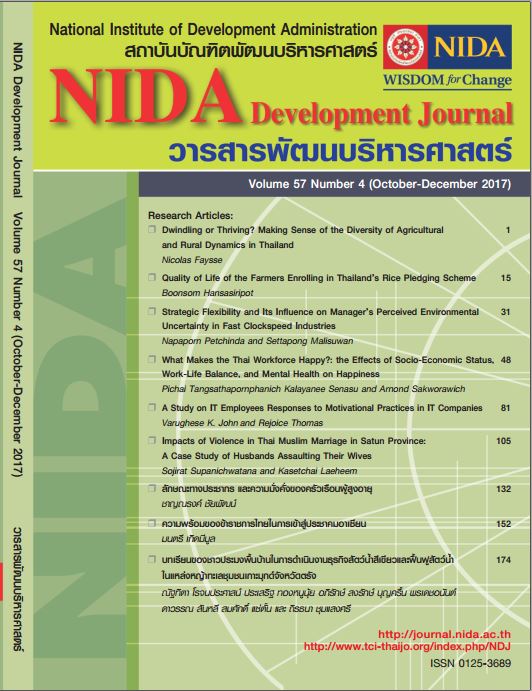Lessons Learned for Small-Scale Fishers in Performance of Green Aquatic Animal Business and Aquatic Animal Restoration in Seagrass Beds of Koh Muk Community, Trang Province
Keywords:
Lessons Learned, Small-scale Fishers, Green Aquatic Animal Business, Aquatic Animal Restoration, Seagrass BedsAbstract
This study aims to retrieve lessons that small-scale fshers have learned about performance of green aquatic animal business and aquatic animal restoration in seagrass beds of Koh Muk Community, Trang province. The 45 participants in community forum were small-scale fshers, researchers, community developer in Koh Libong Sub-district Administration Organization, experts, provincial electricity authority offcers. RMUTSV students, and observers. Empowerment evaluation method was used in retrieving lessons had three steps: I) mission or goal; II) taking stock; and III) planning for the further. Three activities selected for retrieving lessons included aquatic animal trade group, aquatic animal processing group, and coastal resource conservation group. Overall results in operating plan of the Lae Lay group would lead to formulate strategies for future operation. Aquatic animal trade made little proft because it was just started whereas aquatic animal processing group had quite a good proft from its business. The coastal resource conservation group had progressed in several activities, for example, aquatic animal breeding (blue swimming crabs and squids) to release back into the sea, planting seagrass, and transferring indigenous knowledge of small-scale fshers to the youth. However, surveillance fund setting had no progress. In conclusion, strategies for future operation had been set up. Aquatic animal trade group had 4 strategies: 1) fnding market for aquatic animal trade; 2) screening quality of aquatic animal; 3) buying aquatic animal; and 4) nursing living blue swimming crabs. Aquatic animal processing group had 3 strategies: 1) producing goods (materials, producing, and packing); 2) creating product brand; and 3) increasing market channels for selling products. Coastal resource conservation group had 2 strategies: 1) youth meeting for transferring knowledge about marine resource conservation; and 2) surveillance illegal fshing gears to destroy aquatic animals.





